
Rita Pinedo waters her plants inside her gardening plot. (Photo by Ricky Rodas / California Health Report)
This story originally appeared in the California Health Report.
On a recent weekend, Maria Casas was tending to her plots at La Madera Community Garden in El Monte. Casas carefully watered her brightly colored flowers, zucchini and plump, red tomatoes in the garden plot nestled in Los Angeles’ San Gabriel Valley. Once the tomatoes are ripe, she’ll pick them and make sauce in bulk, preserving the harvest in mason jars.
Saving money and preserving produce has always been a priority for the longtime El Monte resident. Now that ongoing U.S. tariff policies are leading to price uncertainty at markets across California and nationwide, Casas said having the garden as a community resource is even more important. As Californians begin to see impacts from tariffs, some are leaning on community gardens to offset rising grocery costs, as well as find community amidst the federal policy changes that are affecting daily life.
President Donald Trump announced on inauguration day in January that he would create a new tariff policy for U.S. trading partners. Tariffs, a tax placed on goods imported from other countries, are typically used as a revenue-generating tool and can potentially protect domestic producers of goods like agricultural produce. While the federal government can make money from tariffs, import companies typically raise their prices to recuperate losses, ultimately passing the increased costs onto consumers.
Since this announcement, Trump has threatened, imposed and rescinded some tariffs on imports from all countries and territories, including the U.S.’ biggest competitor, China. Several nations like Canada, Mexico, China and England issued retaliatory tariffs. In late May, a panel of international trade court judges halted a number of the administration’s actions including the universal 10 percent tariffs on all countries as well as separate tariffs placed on Canada, China and Mexico. As of now, the U.S. will still be able to collect tariffs due to a D.C. federal appeals court’s temporary halting of the international trade court’s decision.
Higher grocery prices likely
James Sayre, an assistant professor of cooperative extension in UC Davis’ Department of Agriculture and Resource Economics, is keeping an eye on the fluctuating tariff policies and is studying their potential impact on not just grocery prices but also California’s domestic agricultural production. Sayre’s work as an agricultural economist involves conducting research on federal and state policies that affect California’s food supply chains. He then takes this research and creates presentations to directly explain the results to farmers and consumers throughout the state.
Sayre told the California Health Report that Trump’s tariffs could increase costs for produce but not in the ways we might expect.
California is an agricultural powerhouse and is responsible for about 32 percent of the U.S’ agricultural production and produces roughly 41 percent of its agricultural exports, according to Sayre. “California has an ideal growing climate for lots of things.” Sayre said, “So a lot of the fruit and vegetable food supply chain is located here.”
Despite this, the state is still reliant on agricultural imports from Mexico because of seasonality. If a grocery company wants to stock produce like strawberries or avocados year-round, then it will import those crops when they are out of season in California. “When you get to March — that’s when produce is sort of at a lull — it’s in those periods when we’re importing the most from Mexico,” Sayre said.
Some of these imports are currently exempt from tariffs under the U.S.-Mexico-Canada Agreement, which should be good news for local farmers. Californians will still see an impact, though, because “as long as we’re importing any product from abroad, an import tariff is going to raise that cost,” Sayre said. “And domestic producers, to fill in for that missing supply, will raise prices.”
Sayre said uncertainty in the trading markets will also impact consumers. Frequent fluctuations in tariffs can increase the economic risk for companies, which can lead to shortages or higher prices at the grocery store, he said. Economists track trade policy uncertainty using online tools such as the Economic Policy Uncertainty Index or Bloomberg’s trade uncertainty index, both of which have catalogued extraordinarily high levels of uncertainty since this year’s tariffs were announced. “ If you don’t know what’s going to happen with tariffs, these companies are not going to make investments and ultimately that’s going to hurt consumers,” Sayre said.
Rita Pinedo, who also tends a plot in the La Madera garden, said she’s starting to notice price increases at grocery stores in El Monte where she’s lived for decades. Some of the largest chains in the area include Vallarta Market and Superior Grocers. She also says that there are few options for high-quality fruits, vegetables and herbs in the stores. “They need to have more organic produce because the truth is there’s very few organic options [around here],” Pinedo said in Spanish.
Pinedo started gardening at La Madera over a year ago. She didn’t have experience with gardening but was motivated to grow her own vegetables after her niece, who studied agriculture, told her about the chemicals and pesticides often used in conventional farming. “I asked myself, ‘Wow, what are we eating?’” Pinedo said.
After a year of consistent gardening, Pinedo has learned to grow everything from potatoes to tomatillos to lettuce. “Increased prices are another motivator for me to figure out how I can grow even more vegetables in my plot of land,” she said.
A space for community building and healing
On the other side of La Madera, Casas was admiring the vibrant orange and yellow colored marigold flowers she planted in her second gardening plot six years ago.
Marigolds are a central component of Día de Los Muertos celebrations in Mexico and are believed to guide fallen spirits back to earth. Casas said that the marigolds are a great example of La Madera’s cultural contributions to El Monte. “ We’ve been successful because we are able to grow a lot of flowers and sell them to our community [during the festivities],” she said. “It is nice to see people come and buy fresh flowers, and then they are so happy.”
Casas has been a member of La Madera since its founding over 20 years ago. The garden is located on a third of an acre in a residential neighborhood and has over 40 plots which community members pay a monthly fee for each plot they cultivate. Leasing prices range from $10 to $20, depending on the size of each plot. Garden members are free to keep their crops or share and trade amongst each other. Aside from the plots, La Madera also offers yoga and Pilates classes, holds grief circles and has a woodfire oven that members can be trained to use.
Crystal Yniquez, an El Monte native and La Madera’s current manager, has been working with longtime members to spread the word about the garden in El Monte and surrounding cities. She manages the garden through her family’s nonprofit, Good Fight Foundation, which was founded in memory of her brothers. In 2016, Yniquez’s youngest brother, Raymond Yniquez, and his two friends died in a car accident in Arcadia. Her other brother, Andrew Cuevas, was shot and killed by Riverside County Sheriff’s deputies while Cuevas was experiencing a mental health crisis, Yniquez said.
Yniquez joined the garden more than a year ago after looking for a place to plant her own crops. What started out as a way to grow her own food became a positive outlet to process past grief.
“ I’ve seen improvements in my mental and physical health through gardening as a way to heal the trauma of losing my brothers,” Yniquez said.
Casas also credits her time in the garden as a major source of healing. In 2005, Casas struggled after giving birth to her youngest child, who has special needs. Her son spent the first four months of his life in and out of the hospital. Casas quit her job to care for him, but developed severe depression and anxiety herself. “My oldest son, who was 19, tried to help me out. So one day, he said, ‘Mom, do you want to plant at a community garden?’” Casas recalled. She said yes and began spending two hours a day gardening. “I was going back home in better shape and I was able to take better care of my children,” she said.
For Yniquez, it’s more important than ever that La Madera continues to be a community hub where healing can occur. She cited ongoing anxiety about economic uncertainty and concerns about the growing presence of Immigration Customs Enforcement officers throughout LA County.
“Being able to create a space where we keep each other safe and keep each other informed, it’s worth it,” Yniquez said.

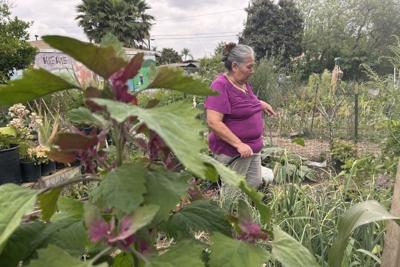
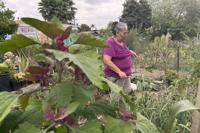

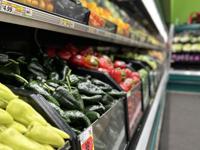

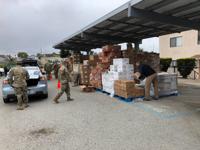

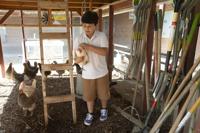






(0) comments
Welcome to the discussion.
Log In
Keep it Clean. Please avoid obscene, vulgar, lewd, racist or sexually-oriented language.
PLEASE TURN OFF YOUR CAPS LOCK.
Don't Threaten. Threats of harming another person will not be tolerated.
Be Truthful. Don't knowingly lie about anyone or anything.
Be Nice. No racism, sexism or any sort of -ism that is degrading to another person.
Be Proactive. Use the 'Report' link on each comment to let us know of abusive posts.
Share with Us. We'd love to hear eyewitness accounts, the history behind an article.